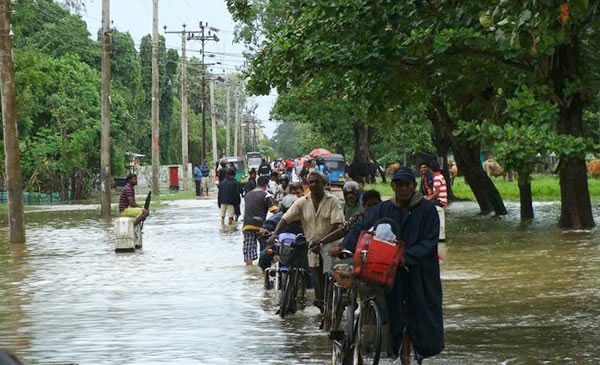
Rishani Wijesinghe, Advocacy Coordinator for Oxfam Australia, meets survivors of the floods in Sri Lanka in January.
When the rains began, Janaka Kumara was at home with his wife and four children. It was the fourth day since the ceaseless downpour and strong gale-force winds had started in Dalukana when Janaka knew his wattle-and-daub house would not survive the storm. As reluctant as he was to leave, he knew he had to get his family to safety as soon as possible, for the rising water levels from the river would soon make the only road to the main village inaccessible.
Leaving everything behind but the clothes they wore and 200 rupees (AUD$1.80) in cash, Janaka and his wife took the children to the nearby community primary school, which was already filling up with families seeking shelter and safety. Two weeks on, Janaka and his family, along with 20 other families, are still homeless, sheltering in the Namal Pokuna Temple community centre. They are quickly losing hope of returning to their normal lives.
Janaka used to be an ice cream seller and earned a meagre income which wasn’t near enough to feed his fast-growing family. He was forced to abandon his job when he met with a near-fatal accident in Polonaruwa town which left him permanently disabled and unable to make a living. With handouts from his wife’s family and his own, Janaka’s family can barely survive and now live in abject poverty. And today, as a result of the massive flooding and rainstorms, they are homeless. Their house, made of clay, tin sheets and mud, caved in the day after they left for the school.
When the rains started on 26 December 2010, little did anyone know of the severity of the crisis to come. With torrential rains, dangerous electrical storms, intense winds, and flooding, 12 out of 25 districts of Sri Lanka and more than 1 million people have been affected.
Having been asked to leave the shelter in time for the school to reopen for the New Year, 21 families from Dalukana moved to the nearest temple community centre. Life in the community centre is difficult. With so many families living together, the place is crowded. Not much assistance has been provided to the families except for dry food rations which they received on two days. The rations were provided by Jatheen Athara Sahayogitha Sanwadana Kamituwa (JSSK), a community-based organisation and a long-time partner of Oxfam.
JSSK is one of 11 partners Oxfam is supporting to provide cooked food, and just one part of a much wider emergency relief response which includes water and sanitation responses and non-food items (NFIs). To ensure Oxfam reaches the most vulnerable communities, its planned responses are geared to target specific groups such as the women-headed families and the poorest of the poor.
Janaka, who has been assigned the task of monitoring the communal cooking in the camp, says, “It is very difficult living here in the community centre. We have no clothes; have no mosquito nets or any money. There are schoolchildren and pregnant women here, but we don’t have milk or medicine. The only help we got was from JSSK. We wish to get back to our normal lives soon but we are not sure when that would be possible.”
Read more about our response to the Sri Lanka floods
Donate to our Sri Lanka floods appeal